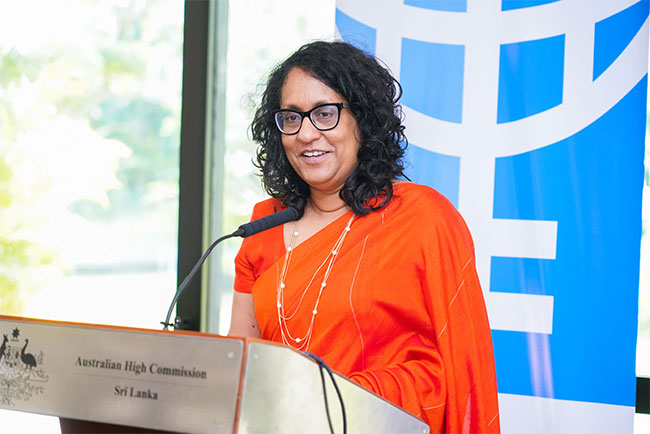Prime Minister Harini Amarasuriya emphasized that gender inequality is not just a women’s issue, but a societal challenge requiring policy changes, education, and attitudinal transformation.
She made these remarks at the official launch of ‘THRIVE – Together for Her: Resilience-building, Inclusivity, and Voices for Equality in Sri Lanka,’ held yesterday (25) at the Australian High Commission in Colombo. The event was jointly hosted by the Australian High Commissioner, UN Women, and Chrysalis, according to the Prime Minister’s Media Division.
THRIVE is a five-year initiative implemented by UN Women and Chrysalis, funded by the Australian Government. It contributes to achieving Outcome 6 – “Gender Equality and Women’s Empowerment” – under the UN Sustainable Development Cooperation Framework for Sri Lanka (2023-2027), co-signed by the Government of Sri Lanka and the United Nations.
The initiative aims to enhance gender equality by strengthening the economic and social resilience of marginalized women, particularly women with disabilities, women-headed households, and those in the plantation sector, across six districts—Mannar, Kilinochchi, Nuwara Eliya, Badulla, Moneragala, and Colombo.
Delivering the keynote address, Prime Minister Amarasuriya stressed the need for structural and attitudinal change to achieve gender parity and eliminate violence against women. She noted that while Sri Lanka ranks high on the Human Development Index, with a literacy rate exceeding 92% and over 60% of university students being women, only 35% of women participate in the paid workforce. “It is necessary to ensure that women have opportunities to contribute to the economy through employment and equal pay while recognizing and valuing unpaid care work, which is disproportionately carried out by women.”
She highlighted the Women Empowerment Act, passed in 2024, which includes establishing an independent National Commission on Women and a National Fund for Women. The appointment process for commissioners is currently underway.
The Prime Minister also underscored government measures aimed at supporting women and young girls through the national budget, including free uniforms, shoes, sanitary facilities, meals, books, and stipends to ensure that children from marginalized communities remain in school.
However, she pointed to persistent challenges, stating that 90% of women in Sri Lanka have faced sexual harassment on public transport at least once in their lifetime. She added that the country ranks 122nd out of 146 on the Global Gender Gap Index, showing that gender disparity is not just a women’s issue, but a societal challenge that transcends gender, race, religion, and age.
Amarasuriya also warned of new threats emerging in the digital sphere, where technological tools are being misused to silence women, reinforce biases, and fuel harassment. “The government remains committed to closing the gender digital divide and ensuring that women, especially young women, can participate independently in the digital economy.”
She concluded by reiterating that gender inequality demands collective action, and collaborative efforts like THRIVE are essential to creating a future where all women have equal opportunities to succeed.
The event was attended by Australian High Commissioner Paul Stephens, UN Women Deputy Regional Director for Asia and the Pacific Maria Holtsberg, United Nations Resident Coordinator Marc-André Franche, and other distinguished guests.





